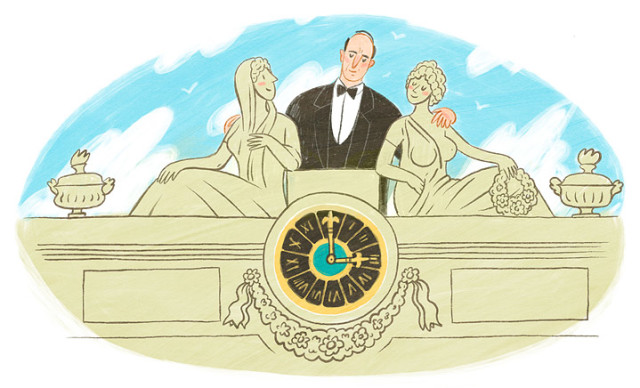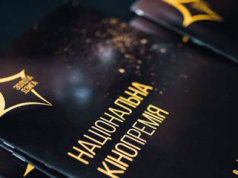Summer in Odessa! The white acacia blossoms, the beach season arrives, and live music can be heard on the streets and at the seaside day and night. Each summer brings new songs and new hits which are played hundreds of times by the DJ’s of night clubs and cafes. But do you know which melody is heard most often in Odessa throughout the years, in all seasons? It can be heard every hour when the hands of the City Hall clock finish their circular journey. Every hour one can hear it when the clock hands on the City Hall finish their 60-minute cycle. And one can hear it every time a train arrives to the main railway station, or departs on yet another journey. It is the official anthem of the city of Odessa. More precisely, it is the musical theme “Song of Odessa” from the operetta “White Acacia” by the brilliant mid-20th century composer Isaak Dunayevsky. Known as the Red Mozart for his incredible talent and for his glorifying the achievements of the Soviet Union. Yet Dunayevsky never composed lyrics (or slogans therein) — rather he composed popular music. Is it any fault of his that the epic, sublime, optimistic melodies were so well suited to the ideals of building a new communistic order?
Isaak Ber Iosif Betsalev Dunayevsky was born on January 30, 1900 to a Jewish family in the town of Lokhvitsa in the Poltava province of Ukraine. Isaak’s father worked as a cashier at a bank, but also sold lemonade which was considered to be the best in Lokhvitsa. Dunayevsky’s mother, was a very devout woman and tended the home. Although the population of Lokhvitsa was mainly made up of Hasidic Jews, the family did not strongly adhere to traditional theological precepts and aimed to integrate the children into secular society. Isaak was the second child in the family. At the age of six he was already being compared to Mozart: he was able to instantly play familiar melodies by ear on the antique piano, and was composing his own pieces by the time he was ten. It was said that he inherited his talent from his grandfather Simon, who was a famous synagogue cantor and composed beautiful Jewish hymns.
When they were old enough, Issak and his brother Boris didn’t get into the local school because of quotas on the percentage of Jewish children which were extant at that time in state educational institutions. The parents decided to send the boys to school in Kharkiv instead. But this presented another challenge: Kharkiv was outside the “Pale of Settlement.” In Tzarist Russia, to reside outside this designated area, a Jew had to have a special social status — which had to be equal at least to that of a small-time artisan. As evidenced by a surviving certificate, the family decided to send the boys to a master-binder, where they could become apprentices. Only after this, Boris and Isaak Dunayevsky were able to move to Kharkiv and enter the Kharkiv Musical College, which later became a conservatory. Isaak studied the violin and took composition classes. Although the young man dreamed only of a musical career, he also (without quitting the conservatory) attended Kharkiv University’s Law School to appease his father, who believed the musical profession to be mostly unreliable.
Dunayevsky began working as a violinist in an orchestra in 1919, and became the composer and conductor of the Kharkov Russian Drama Theater in 1920. This was a difficult time, with the civil war ravaging the country and the governance of Kharkiv changing several times within the spate of several years as rival armies captured and lost the city in quick succession. Fortunately, Isaak’s music was loved and needed by everyone — the “Whites,” the “Reds,” the Anarchists, the Germans and the Ukrainians all needed to be entertained after a battle. Very quickly, Dunayevsky becomes famous in Kharkiv as violinist and composer. His propensity for hard work amazed everyone: often, he was able to create an original melody in just a day or two.
At a certain point, the young composer abruptly changed the course of his career and became a manager in the department of foreign trade of the Ukrainian Soviet Republic — according to some accounts this was done to avoid serving in the army. Yet even while working at the trade offices, he hear music everywhere: in the clicking of the typewriter, in the ringing of the telephone, in the slamming of doors. One day, distracted, he sketched a note staff and a short musical phrase in the corner of a business letter, and accidentally sent the message to Moscow. The answer came back by telegram: “We are not aware of this code. Please indicate what you were trying to convey.”
During these years, another Dunayevsky’s passions soon became manifest — that for women. Not just women, but beautiful women in whom he sought perfection, just as he did in his music. Women inspired him, and he wrote music for them. He married for the first time at the age of 21, and for the second time –at 25. Dunaevsky was drawn to talented, charismatic women — actresses, singers and ballerinas. The Ballerina Zoya Pashkova, Dunayevsky’s civil wife, would bear him a son, Maxim, who would go on to be a composer himself, and compose music for the extremely popular Soviet films “D’Artagnan and the Three Musketeers,” “Oh, Vaudeville, Vaudeville,” “Carnival,” “Goodbye, Mary Poppins!” and “The Green Van.” In addition to the relationship with Pashkova, Isaak Dunayevsky carried on some very candid correspondence with numerous female fans of his talent. As one of his biographers noted, the amorous composer invented the long distance internet romance long before the advent of the internet.
By 1924, the Soviet Union empire was well established, and anyone with an ambitions character rushed to its capital. Kharkiv became too provincial for the Mozart from Lokhvitsy. Dunayevsky moved to Moscow at the invitation of a theater director. From 1924 to 1926 he was the musical director of the Hermitage Theater, and from 1926 to 1929 — that of the Theater of Satire. For this theater, he writes his first operettas — “Grooms” and “Knives.” It is the composition of operettas, light music attracting the general public, that fully revealed the musical talent of Issak Dunayevsky and brought him fame in the capital.
The next stage of Dunayevsky’s career took place in Leningrad. After moving to the city in 1929, he became the musical director and chief conductor of the Leningrad Music Hall. This small theater was an experimental platform for the famous Odessa native Leonid Utesov, who was interested in popularizing jazz and finding its unique “Soviet style.” The two musicians quickly found common ground, with Dunayevsky writing some jazz variations of folk songs and a jazz medley “Music Shop” — jazz interpretations of classical melodies by Giuseppe Verdi, Nikolai Rimsky-Korsakov, Pyotr Tchaikovsky. He doesn’t forget his beloved operettas, though: in 1933, the Music Hall stages the operetta “Mamzelle Nitouche” by Florimon Hervé under the name of “Celestial Swallows” in the musical adaptation of Isaak Dunayevsky to great success.
However, true renown and the title of the principal composer of the USSR was brought to Dunayevsky through film. He was introduced to the field by Leonid Utesov and the director Grigory Alexandrov. This trio created a new genre in Soviet cinema — the musical comedy. Their first joint film, “Merry Fellows,” released in 1934 was a resounding success, and the songs from the movie quickly became known in every household. Although, there was quite a scandal associated with the “Merry Fellows March” (“Walk through life with a song”). In mid-1935, the First International Film Festival in Moscow featured a screening of the American film “Viva, Villa” (“Captain of the Freedom Army”), and the audience noticed that the melody of the theme song of the film’s Mexican revolutionaries was very similar to the “Merry Fellows” March. Disputes as to who stole the melody from whom continue to this day in certain circles.
After “Merry Fellows,” many musical films followed, including “Circus” (1936), “Captain Grant’s Children” (1936), “Volga-Volga” (1938), “The Radiant Path” (1940) and “Kuban Cossacks” (1949). During his life, Dunayevsky wrote music for 27 live action and animated films. Most of them were created during the Stalin era and were in keeping with appropriate Soviet ideology. By association, Dunayevsky was seen as a great singer of the Stalin era — the court composer of Joseph Stalin. The leader of the Soviet state had a perfect understanding of art’s place in creating an ideology and encouraged many artists. Besides, he was a sincere fan of the composer’s works.
But the relationship between Dunayevsky and Stalin was not without difficulty. They never met in person, although Dunayevsky received two Stalin Prizes — in 1941 and in 1951. As early as 1937, after the overwhelming success of the film “Circus” and the “Motherland Song,” Stalin commissioned a “Stalin Song” from the composer. Upon hearing it, however, Stalin was unhappy with the result, even noting that “Comrade Dunayevsky applied the entirety of his remarkable talent to make sure that no one shall sing this song about Comrade Stalin.” For anyone else this would have been a terrible verdict, but Dunayevsky was too popular in the USSR, and he was needed by the regime. He even got away with the fact that in 1953 he refused to sign a letter on behalf of Jewish artists condemning the doctors during the doctor’s plot — which was a contrived political trial typical of the Stalin era. Not having done so required significant physical courage.
Thus, the extended list of the composer’s state awards masked the continuing struggle between the composer and the Soviet nomenclature and bureaucracy. On the one hand, the composer was pampered by those in power and enjoyed direct access to luxuries of which most people in the Soviet Union could only dream of: a personal car with a driver, an apartment in the center of Moscow, a large dacha. On the other hand, he was subjected to constant pressure and control. For example, in the course of the Soviet crusade against cosmopolitanism, numerous works by Dunayevsky on Jewish themes were deemed inappropriate. When Stalin was himself informed of the extensive earnings of the composer, the Secretary General issued a special decree limiting the amount of royalties for the public performance of the composer’s works.
After Stalin’s death, Dunayevsky wrote, as if to justify himself: “It could be said that, to some extent, joy and affirmation of life were the major distinguishing marks of the Stalin era in art. In this joy and affirmation, we were all, more or less, singers of the Stalin era. And among these singers my voice was, perhaps, the strongest and most sonorous. It was a happy coincidence of the character of the epoch with the character of my personal creativity, so fully realized and so well loved by the people precisely during this epoch.”
In the end, Dunayevsky grew tired of the realities of Soviet art. He yearned for real human stories – rather than assigned ideological set pieces – to inspire his compositions. In 1950, he refused many commissions and wrote that he envied the composers of the past: “I would like to see what Tchaikovsky would create on the subject of collective farms. I would like to hear what kind of music Rimsky-Korsakov would write if Scheherazade was a member of the farming cooperative ‘Red Plowman’ or a Nogin factory worker.” So it is not accidental that the composer’s last work, the unfinished operetta “White Acacia” (1955), is a timeless story about true love, taking place in Odessa. The operetta is often heard at the Odessa Theater of Opera and Ballet, and was made into a feature film with the great Odessa actor Mikhail Vodyanoy. This light, cheerful, lyrical comedy with exquisite music is a precious parting gift to the city from the great Red Mozart.
Vadim Goloperov is a staff writer at The Odessa Review




































